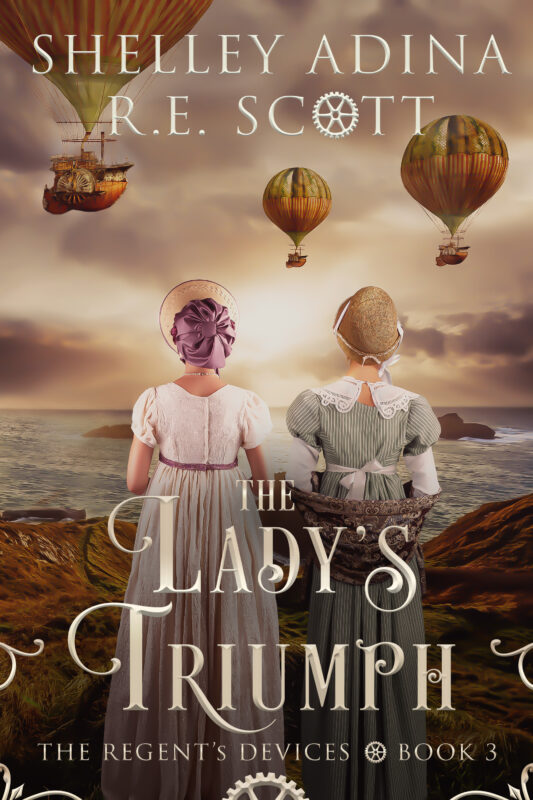
The Regent's Devices • Book 1
Napoleon is determined to conquer the world with his steam-powered weapons. Nothing in England can stop him … except two young lady inventors.
In 1819, France is surrounded by armies. With Russia in the north, the Karlsruhe Confederacy in the east, and a pirate kingdom in the south, Napoleon cannot break out, nor can the English Navy seem to break in. Europe teeters on the edge of a sword. Whichever side rules the air will win.
Celeste Blanchard, daughter of the Emperor’s disgraced Air Minister, is running out of time to develop an air ship that can carry his armies to England and restore her mother to glory. But on a daring and desperate test flight, she is blown off course … and washes up, half drowned, on the shores of Cornwall, in the heart of enemy territory.
Loveday Penhale, cosseted daughter of gentry, has her own inventions to build, even as pressure mounts to behave like a proper young lady and seek a husband instead of a design for a high-pressure steam engine. But when Arthur Trevelyan, heir to the neighboring estate, Gwynn Place, asks for her help in rescuing an unconscious young woman on the beach, Loveday discovers an aeronaut and an inventor as skilled as she is. Between them, a friendship blossoms, and Loveday wonders if they might even pull off the impossible and invent an air ship that will catch the eye of the Tinkering Prince Regent, who has offered a prize to anyone who can help England break the impasse. Celeste’s loyalties are torn in two. If she is caught working secretly for France, she will lose her friend, the love of an honorable man—and her life. But if Napoleon learns she has betrayed him, she will be executed on sight.
Can friendship prevail in the face of war? Or is there a third solution—one where everything hinges on the bravery and daring of a Cornish debutante and the Emperor’s aeronaut?
Chapter 1
© 2022 Shelley Adina & R.E. Scott
Truro, Cornwall — May 1819
For the love of Saint Piran, Loveday, this is not your mother’s kitchen!” Thomas Trevithick’s red hair practically stood on end with rage. “Either give that hammer to someone who knows how to use it, or go home and learn how to cook.”
Loveday Penhale braced herself against the overwhelming urge to apply the hammer to Thomas’s nose. Only the fact that it had already been broken once, thus rendering her efforts redundant, saved him. That, and the fact he had inherited the steam manufactory from his uncle, the great Richard Trevithick, whom she had worshipped and now mourned as lost forever. She would not willingly damage any relative of her mentor.
Instead, she simply applied the muffled hammer with increased force to the sheet of copper she was shaping for the new boiler design. The sheet gleamed in the light of the manufactory’s isinglass windows, kept sparkling clean by their concerted efforts so that they might see what they were doing, even on the gloomiest winter’s day.
With the back of one heavily gloved hand, she smoothed away a lock of wavy blond hair that had fallen out of its knot and somehow escaped the kerchief she had tied over it. She was hot, and the leather apron was heavy. Emory Thorndyke had cut it down to fit her when her old one fell to pieces, but on this May day, with the sun slanting in the windows, she felt every inch of its protection.
An hour later, the sheet of copper had submitted to her persuasions and become part of the boiler for the high-pressure rolling engine, which would be complete, if all went well, by the time of the Tinkering Prince’s royal visit. Provided, of course, that happy event ever became more than a rumor.
Her arms ached, her back had a kink in it, and she looked a complete fright, she was quite certain. But no one here cared about anything except the pleasing curve of the boiler and the neat row of rivets that marched down the seam between today’s piece and the one she had installed yesterday.
In the distance, the bells of St Mary’s parish church in the center of Truro began to toll the hour. One. Two. Three o’clock.
“Oh, dear.” Loveday scrabbled at the knot in the ties of her apron, finally gave up, and heaved it off over her head.
She did not look at Emory, who made a point of staying hours later than she on Wednesdays. He was a man, independent and free to manage the hours of his day as he pleased. She was not even supposed to be here, and it was only because as a girl of fifteen she had assisted the great Trevithick himself that his nephew permitted her to continue the association. But on Wednesdays, when her father was in Truro, meeting with his friends on market day, Loveday must perforce be home in time for tea, washed, combed, and with the flush caused by the hot metals and oils subsided to a ladylike pink, before he himself rode in.
Piffle, she thought, gritting her teeth as she slid the stable door aside. The stableboy, standing next to Rhea, already in the cane whiskey’s harness, grinned. “Three of the clock, miss.”
“Thank you, Toby, I heard. Give this to your grandmother, will you?” She dropped a shilling into his grubby palm. “My sister reports that the elderberry syrup has soothed her cough. She is very grateful.”
Gwendolyn had not specifically said so, nor would she have thought to send the coin, but Toby’s shining face was its own reward.
“Thank you, miss.”
Old Mrs Protheroe was an herbwoman of some renown in Truro. Some called her a white witch. Likely the same prattle-boxes who called Loveday a hoyden and a disgrace and oh, wasn’t it a shame that George Penhale, the heir, had been killed in France and that reckless tinkering girl could do nothing but add to the burdens their poor parents had to endure in their mourning?
Loveday slapped the reins over Rhea’s glossy brown back, and startled, the horse lurched into motion across the stableyard of the steam works. They lived only six miles from Truro, but on market day, the road was clogged with farmers’ wagons returning empty, with women walking home carrying laden baskets, and with the occasional smart group of soldiers of the local militia, who fancied themselves cavalry, trotting in toward their billets.
It took every bit of skill Loveday possessed to keep Rhea from dancing and shying, especially when the soldiers passed four abreast and did not have the courtesy to give way to a lady driving a cane whiskey. “Move your blasted beast, you stupid potted wilkie!” she shouted as poor Rhea slowed to a walk while her left-hand wheel did a proper job of cleaning the mud off the soldier’s leather boot.
“Harridan,” the soldier muttered.
“Pillock!” she flung over her shoulder. Her hearing was quite acute, which was useful when one had two younger sisters.
Honestly, was the militia so desperate for recruits that it had to settle for men such as these? Why had they not joined the army proper, and gone to fight Boney like George—Jory to the family—had? England would never win this war if Napoleon was not stopped on the sands of his own shores. The militia was supposed to be composed of fierce old men who would give rudimentary training to boys too young yet to enlist, not able-bodied boors like the ones who had just passed. If the news sheets had their facts in order, the war was at an uneasy stalemate. A breeze blowing one way or the other could set it off.
If only the King had not bought Upper Canada! For once Napoleon came to power, he had taken that sum and gleefully invested it in engineering science, inventing engines that staggered even Loveday, who was no laggard in her studies of such matters herself. What twisted mind could have taken the engine invented by Papin and created the steam behemoths that rolled over the battlefield, crushing all before them? And what about Fulton’s sous-marin? Because of that wretched invention, England’s shipping industry was not only crippled, she had lost the battle of Trafalgar because of the nuisances below the waves. It was only by the grace of God that the sneaky French had not yet figured out how to give the sous-marin a size sufficient to carry troops.
Rhea crested the hill, and in the distance Loveday could see Hale Head, the cliff promontory giving their family its name, crouching in the sea like a watchful lion looking out into the Channel.
Halfway home.
At least they had steam cannons, Loveday consoled herself. Their use had netted General Wellington a dukedom and set the French back on their heels when the pressure-powered balls had breached the behemoths’ skins. But they had not suffered such a setback long. Their repeating rifles that turned on a crank had harried Wellington’s troops repeatedly at short range, after which the French troops would run back into their hideouts in the dry hills. Where the cannons could not find them.
Rhea’s hooves made a hollow sound on the arched bridge over the Gwynn Bourne, the river that formed the western boundary of their neighbor’s estate, Gwynn Place. Such an elevated name for a rambling brick and stone farmhouse set in acres of hay and tenant farms. She preferred the Cornish: plas-an-gwynn. The place of the winds. Overlooking the estuary on its rolling hills, it was a pretty enough property. The Trevelyans had suffered, too, at the hands of the French, though not nearly as badly as the Penhales. At least Arthur, the son and heir, was alive, unlike dear Jory. He’d had one leg smashed by a piece of an exploding behemoth and could not yet walk.
Rhea climbed out of the bourne’s little valley and thence to the Penhale acres. As the Trevelyan twins might say, there was a distinct lack of heirs in the neighborhood. It did not affect Loveday personally, for she had other plans for her life. But at eighteen and sixteen, her sisters Rosalind and Gwen felt it keenly.
Just one more thing to hate Napoleon for.
Loveday turned Rhea’s head and they plunged into the cool green depths of the long lane that led home.
* * *
“What is the news from town, Papa?” Rosalind took the plate on which their father had just laid a slice of roast pork and helped herself to apples cooked in syrup, buttered beans, and the first lettuces of the season.
The carving for his family completed, George Penhale senior flipped his coattails out of the way and sat down to his own dinner. “There is talk that the Prince Regent will make his progress here as soon as July,” he said.
“At Christmas, it was to be March,” Loveday complained, eating as fast as she dared. “Now it is July? Perhaps he will not come at all. He is not the sort of man to enjoy being paraded about the countryside. He is still in mourning, even if the ton is not.”
“And what would you know of him or the ton?” mocked Gwen. “None of us have even seen him, never mind become so well acquainted with the royal character.”
“I have a mind, and I apply it,” Loveday informed her loftily. “Besides, the newspapers have so much to say that we might all be as well acquainted with him as anyone at court.”
From all accounts, Prinny, as he was affectionately known, was a man of medium height and slender build, his myopic blue Hanover eyes hidden by thick spectacles. After the death of his only daughter, the lovely Princess Charlotte, he had gone into seclusion, having no use for the social whirl of the ton or for making himself a leader of fashion. Rather, he preferred his laboratory that filled an entire wing at St James’s, or living the life of a country gentleman at his castle in Scotland, well out of sight of critical eyes. Caroline, the Princess of Wales, her character the opposite of his in every way, preferred to hold her own court under the domes of her Pavilion in Brighton, an edifice that looked to be every whit as silly and fanciful as she was herself.
“Poor Prinny,” Mama said sadly. “His father gone blind and mad as a hatter out in Windsor, his daughter and baby grandson both dead, his wife a social butterfly living a separate life…” With a shake of her head, she addressed herself to her roast, and did not finish her sentence out of consideration for her daughters’ delicate sensibilities.
Loveday had heard the rumors of the princess and her Italian count. But such was not a suitable topic of conversation at Papa’s table.
“He would probably have been much happier in a cottage than a palace,” Rosalind offered. As the middle daughter, she did not speak up much, but when she did, it was usually to the point, and with more insight than one would expect of someone only eighteen and not much inclined to company.
“Perhaps,” their father said. “But a man of his talents ought to be turning his hand to solving the French problem, not gallivanting about the country, much as you girls want to see him. Such a great inventor he is supposed to be, and yet he has not found a way to end this war with an English victory.”
“Now, dearest—” their mother began.
“Dash it all, Mrs Penhale, it is the truth.” Papa sawed at his slice of roast with energy. “At the very least, he ought to form a Ministry of Engines or Devices or War or some such, and let the First Admiral have a go at it.”
“You have signed the petition, haven’t you,” Loveday said on a sudden burst of realization. “To have the Prime Minister insist on the formation of just such a ministry.”
Papa gazed at her. “And how did you come to that conclusion?”
Loveday flushed. Once again her inability to hold her tongue had tripped her up. “Because it is common knowledge in Truro that Lord St Aubyn has signed it.” Head of the leading family of the district, where his lordship led, the other gentry tended to follow.
“Mr Trevelyan has signed it, too,” Gwen put in. “I heard it from Cecily and Jenifer when I called this afternoon.”
Their father glared, clearly displeased—not that his news was no longer so fresh, but that his daughters were engaging in politics. Or as good as.
Loveday could only feel grateful that she was not the only black sheep in poor Papa’s fold. Well, Gwen and Rosalind were merely a pale grey, not black. But still. He would be so angry to know that she was still assisting at the Trevithick Steam Works. Every day, she was in danger of his ringing such a peal over her head that she would likely go deaf. But until that day…
After dinner, she excused herself to go upstairs and put off her pale lawn dinner dress with its whitework embroidery all around the hem. She liked pretty things as well as the next girl; she was a competent needlewoman and had embroidered the overskirt herself. But she was practical, too, and knew it would never survive a moment in her workshop in the barn. She put on an ugly chambray dress that was too short to wear to the steam works, but which served her well at home. Then she slipped down the servants’ stairs to the door to the kitchen garden, hurried down the burgeoning rows of peas and carrots, and through the gate in the wall to the older of their two barns. Here, in a room that had been the tack room before they’d built the carriage house and stables, was her workshop.
Her current project was a piece of furniture. Emory would laugh at her making something so prosaic, something that did not require steam power and therefore should be beneath her notice. Emory was a man of singular interests. She couldn’t wait for the day when some young lady knocked him off his intellectual pedestal and explained to him that he was a man like every other and ought to have a more well-rounded life. Or at the very least, a life.
This piece of furniture, a kind of sideboard, had been brought home on a tea clipper by some seafaring relative during the previous century. Her mother disliked it—said its ivory and black wood was too stark and unbeautiful to have in her pretty rooms. Loveday had a sneaking suspicion that it was the seafaring relative she hadn’t liked, not the sideboard. In any case, Loveday was experimenting with its repair.
“Now, me dear,” she said to it, “let us make another attempt, shall we?”
The original sideboard had once been designed to move on its own, but the cogs and pulleys were rusted and broken and it was difficult to see what their original movements had been. Loveday had just read a monograph from London in which automatons—which were essentially as devoid of life as a sideboard, were they not?—had been made to move and even provided simple services to the scientist, such as carrying a tea tray. If the same rudimentary principles had been applied years ago by some foresighted genius in a far country, could she not both learn from them and bring them up to date with her own modern knowledge?
Its weights, gears, and connectors had clearly once been meant to get the boxes to assemble themselves into various configurations. If she could make it over, the sideboard would be useful again. It was all in the physics and the mathematics… and in a few modern parts.
Granted, she was mostly self-taught in those subjects. The education that Papa had seen fit to give his children had mostly been for Jory’s benefit, but she and Rosalind had been rather good at stealing his books and putting them back before they were missed. Loveday had read every book the subscription library had possessed on the two sciences and spent her pin money not on bonnets and ribbons—well, perhaps only a little of it—but in the bookshops in Truro and St Mawes. And then, of course, there had been her training in engineering under Richard Trevithick, which was every bit as good as a man would have received at Oxford. Probably better, since she had not had to waste time on Latin and history.
Her Latin was appalling, her history not much better. But she knew nearly as much about mechanics as Emory, who had actually been to Oxford.
What Papa did not know about her education would not hurt him. He knew she had been underfoot at the steam works, but he thought she had grown out of her fascination with engines. Little did he know that with every year, every obstacle, it only grew.
With a tiny turnscrew, she made a last adjustment to the connector between two of the boxes. “Let’s see how you do now that I have changed the size of these wheels.”
After laying down a saddle blanket to protect their glossy wood, she positioned the two connected boxes on the shallow stone steps of the workshop. Then, with one finger, she gave the topmost box a nudge.
The two boxes fell over and sprawled on the blanket, still connected.
Loveday let out a long breath. “Bother.”
She seated herself on the step and, chin in hand, gazed at them as the light faded in the sky and the lamplight from the workshop behind her glowed on the wood. Where had she gone wrong?
In her mind, she pictured what should have happened. A change in weight distribution. A fall. The wheels taking up the slack to slow the fall. The forward motion that would have set the second pair of wheels spinning. The second box following the first.
Slack. Spinning.
Tension.
There wasn’t enough tension on the gears!
“Loveday!” She heard Gwen’s voice, faintly, from the flower garden at the front of the house. “Mother is looking for you.”
“Coming!” she called back, tamping down the rush of excitement. Tension. She couldn’t wait for the next bit of free time she could steal in which to make the adjustments. “Come along, then,” she told the boxes as she picked them up. “We’ll try again tomorrow.”












